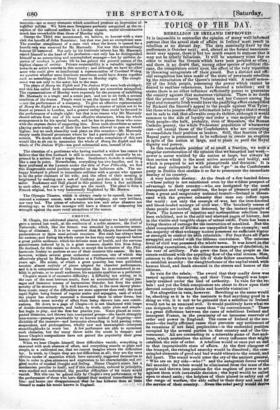CHOPIN. '
M. Chopin, the celebrated pianist, Whose first matinee we lately noticed, gave a second last week,,at the residence of a noble amateur, the Earl of Falmouth; which, like the former, was attended by a numerous 91198333- blage of dilettanti. It is to be regretted that M..-Ghopiu has confined his perthrmances to these semi-private reunions. But such has always been his custom; and during his whole career he has very rarely appeared before a great public audience; which his delicate state of health, and the nervous sensitiveness induced by it, in a great measure disable him from doing. He declined, for this reason no doubt, to accept the invitation of the Phil- harmonic Society to perform at one of their concerts this season. He has, however, written several great orchestral concertos, one of which Was effectively played by Madame Dulcken at a Philharmonic concert several years ago. His music, of which a great quantity has been published, consists almost entirely of pieces adapted for chamber performance; and it is in compositions of this description that he is accustomed to ex- hibit in private, or to small audiences, his exquisite qualities as a performer.
Chopin's music is of excessive difficulty; a'difficulty not arising, as in the case of the most bravura music, from an accumulation of rapid pas- sages and immense masses of harmonious thunder, but from the entire novelty of its structure. It is well known that, in the most showy piano- forte music, many of the difficulties are more apparent than real; the most rapid flights being formed of regular scales and arpeggios, each of which the player has already executed a thousand times in other forms, but which derive some novelty of effect from being thrown into new combi- nations. Sit down to a page of Chopin—it is not blackened with heaps of double-demisemiquavers, and looks, in truth, quite plain and simple: but begin to play, and the first bar puzzles you. Notes placed at unex- pected distances, and thrown into unexpected groups—the hands strangely interwoven—passages predicable by no known method of fingering—nice divisions of the measure—and harmonies abounding in bold passing notes, suspensions, and prolongations, wholly new and unexampled—interpose stumblingblocks in every bar. A few performers are able to surmount such obstacles, but the many throw aside the music in despair; and hence Chopin's compositions have not gained the popularity their great beauty deserves. When we hear Chopin himself, these difficulties vanish; everything is executed with such absence of effort, and everything sounds so plain and simple, to a cultivated ear, that we cannot imagine where the difficulties lay. In truth, to Chopin they are not difficulties at all; they are the most obvious modes of execution which have naturally suggested themselves to him in order to give utterance and expression to his characteristic and ori- ginal modes of musical thought and feeling. Hence Chopin's music has a mechanism peculiar to itself; and if this mechanism, reduced to principles, were studied and understood, the peculiar difficulties of his music would vanish. But this can be gained only by Chopin's own performance, or by the performance of those who have derived their method immediately from him: and hence our disappointment that he has hitherto done so little himself to make his music known in England.


























 Previous page
Previous page